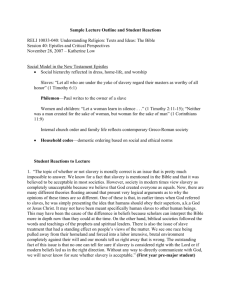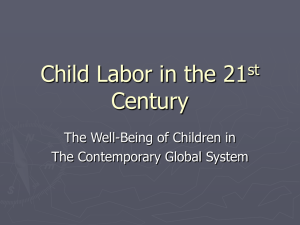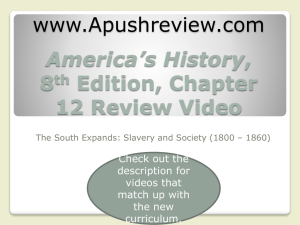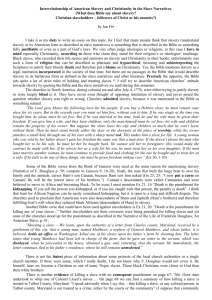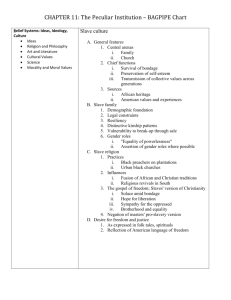Class #8 – Slavery and the Bible Key Issue: Does the Bible Allow
advertisement
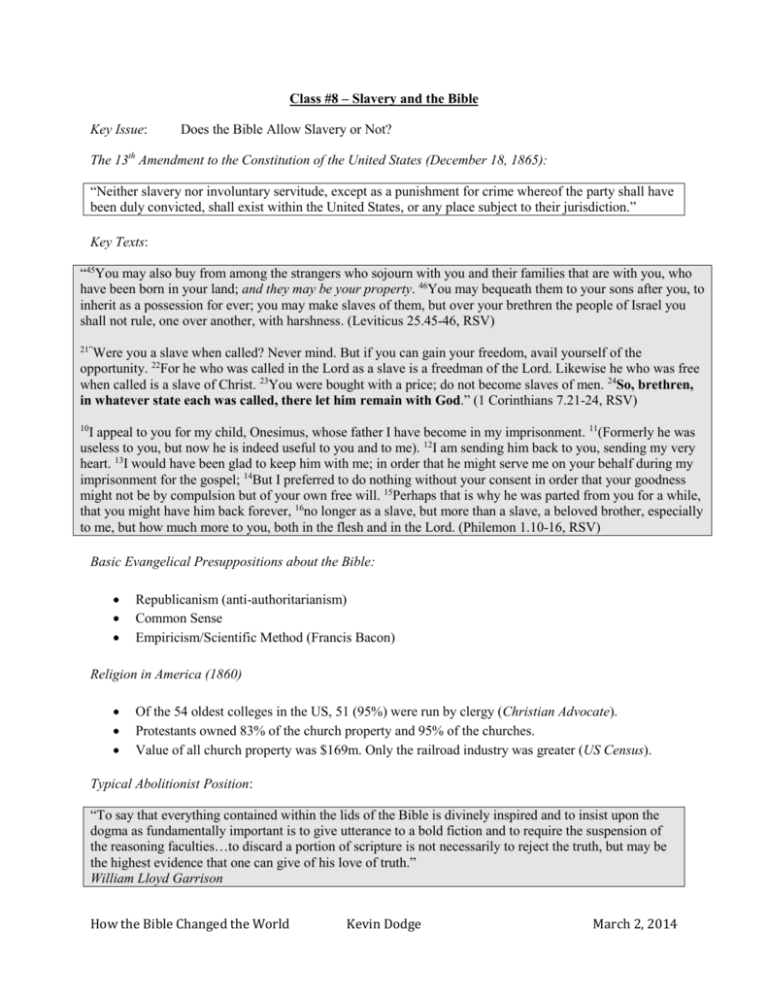
Class #8 – Slavery and the Bible Key Issue: Does the Bible Allow Slavery or Not? The 13th Amendment to the Constitution of the United States (December 18, 1865): “Neither slavery nor involuntary servitude, except as a punishment for crime whereof the party shall have been duly convicted, shall exist within the United States, or any place subject to their jurisdiction.” Key Texts: “45You may also buy from among the strangers who sojourn with you and their families that are with you, who have been born in your land; and they may be your property. 46You may bequeath them to your sons after you, to inherit as a possession for ever; you may make slaves of them, but over your brethren the people of Israel you shall not rule, one over another, with harshness. (Leviticus 25.45-46, RSV) 21” Were you a slave when called? Never mind. But if you can gain your freedom, avail yourself of the opportunity. 22For he who was called in the Lord as a slave is a freedman of the Lord. Likewise he who was free when called is a slave of Christ. 23You were bought with a price; do not become slaves of men. 24So, brethren, in whatever state each was called, there let him remain with God.” (1 Corinthians 7.21-24, RSV) 10 I appeal to you for my child, Onesimus, whose father I have become in my imprisonment. 11(Formerly he was useless to you, but now he is indeed useful to you and to me). 12I am sending him back to you, sending my very heart. 13I would have been glad to keep him with me; in order that he might serve me on your behalf during my imprisonment for the gospel; 14But I preferred to do nothing without your consent in order that your goodness might not be by compulsion but of your own free will. 15Perhaps that is why he was parted from you for a while, that you might have him back forever, 16no longer as a slave, but more than a slave, a beloved brother, especially to me, but how much more to you, both in the flesh and in the Lord. (Philemon 1.10-16, RSV) Basic Evangelical Presuppositions about the Bible: Republicanism (anti-authoritarianism) Common Sense Empiricism/Scientific Method (Francis Bacon) Religion in America (1860) Of the 54 oldest colleges in the US, 51 (95%) were run by clergy (Christian Advocate). Protestants owned 83% of the church property and 95% of the churches. Value of all church property was $169m. Only the railroad industry was greater (US Census). Typical Abolitionist Position: “To say that everything contained within the lids of the Bible is divinely inspired and to insist upon the dogma as fundamentally important is to give utterance to a bold fiction and to require the suspension of the reasoning faculties…to discard a portion of scripture is not necessarily to reject the truth, but may be the highest evidence that one can give of his love of truth.” William Lloyd Garrison How the Bible Changed the World Kevin Dodge March 2, 2014 Pro-Slavery Arguments: “We may safely conclude that the institution of slavery, which legalizes the holding of one person in bondage as property forever by another, if it be morally wrong, or at war with the principle which requires us to love God supremely, and our neighbor as ourself, will, if noted at all in the law, be noticed, for the purpose of being condemned as sinful. And if the modern views of abolitionists be correct, we may expect to find the institution marked with such tokens of divine displeasure, as will throw all other sins into the shade, as comparatively small, when laid by the side of this monster. What, then, is true? Has God engrafted hereditary slavery upon the constitution of government he condescended to give his chosen people – that people, among whom he promised to dwell, and that he required to be holy? I answer, he has. It is clear and explicit. He enacts, first, that his chosen people may take their money, go into the slave markets of the surrounding nations (the seven devoted nations excepted) and purchase men-servants and women-servants, and give them, and their increase to their children and their children’s children forever; and worse still for the refined humanity of our age – he guaranties to the foreign slaveholder perfect protection, while he comes in among the Israelites, for the purpose of dwelling and raising and selling slaves who should be acclimated and accustomed to the habits and institutions of the country. And worse still for the sublimated humanity of the present age, God passes with the right to buy and possess, the right to govern, by a severity which knows no bounds but the master’s discretion. …For the 1,500 years during which these laws were in force, God raised up a succession of prophets to reprove that people for the various sins into which they fell; yet there is not a reproof uttered against the institution of involuntary slavery….the law authorizes that people, to whom he had become king and law-giver, to purchase men and women as property; to hold them and their posterity in bondage; and to will them to their children as a possession forever; and more, it allows foreign slaveholders to settle and live among them; to breed slaves and sell them. (Thorton Stringfellow) John Locke: “This freedom from absolute, arbitrary power, is so necessary to, and closely joined with a man’s preservation, that he cannot part with it, but by what forfeits his preservation and life together. For a man, not having the power of his own life cannot, by compact, or his own consent, enslave himself to any one, nor put himself under the absolute, arbitrary power of another to take away his life, when he pleases. Nobody can give more power than he has himself; and he that cannot take away his own life, cannot give another power over it.” 2nd Treatise on Government, 4.23 For Further Reading: Aquinas, Thomas. Question 94.6: “Whether he who is under a law may act beside the letter of the law.” Summa Theologicae. Volume Two. Notre Dame: Christian Classics Press, 1948. Faust, Drew Gilpin, ed.. The Ideology of Slavery: Proslavery Thought in the Antebellum South: 18301860. Baton Rouge: LSU Press, 1981. Haynes, Stephen. Noah’s Curse: The Biblical Justification of Slavery. Oxford: Oxford University Press, 2002. Noll, Mark. The Civil War as a Theological Crisis. Chapel Hill: UNC Press, 2006. Tomkins, Stephen. William Wilberforce: A Biography. Grand Rapids: Eerdmans Publishing, 2007. How the Bible Changed the World Kevin Dodge March 2, 2014






